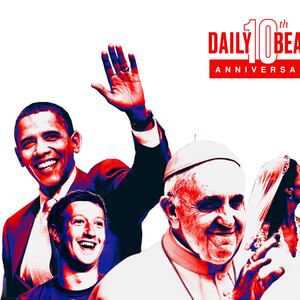A “dim but not commonplace” appearance with a face marked by “morose concentration” was how Leon Trotsky recalled his first encounter with Josef Stalin in Vienna in 1913, 27 years before Stalin ordered a Mexican agent to fatally plunge an ice-ax into Trotsky’s cranium.
A “grey blur” was how the prominent Menshevik Nikolai Sukhanov described the future Soviet dictator in 1917, the year of the Bolshevik seizure of power, a world-historical event in which Stalin, a priesthood dropout turned bank robber, played no discernible role. Sukhanov was later jailed, then shot.
We know from the scholarship on 20th-century totalitarianism that evil can be both banal and radical and that these seemingly contradictory characteristics can be embodied in the same person. Tempting as it is to see the prime movers of history as great men and women, more often than not, it’s the middle managers and grey blurs who conquer and destroy nations.
Under normal circumstances, Vladimir Vladimirovich Putin might today be a track-suited personal security guard for one of the many oligarchs who in fact live and breathe and luxuriate at his pleasure. Short, bald, with an almost reptilian gait, the former KGB case officer never seemed destined for anything other than bit player in the never-ending Russian tragedy.
For one thing, he’s not even from Moscow, but St. Petersburg, where he spent the majority of the post-Soviet democratic interregnum working for that city’s mayor and stealing public funds for his own benefit. Billed later as a master spy in the vein of the legendary Stierlitz, the hero of the classic film Seventeen Moments of Spring, Putin’s most important intelligence assignment was burning documents in a furnace in Dresden, a provincial outpost in the Cold War, as the empire he served crumbled.
His law degree was obtained through plagiarism. His opponents have all been scattered to foreign countries, poisoned, shot, irradiated or imprisoned, or simply allowed to go on opposing him (up to a point) with ever diminishing returns. Today he may be the richest man in Europe, if not the world.
Boris Yeltsin, who actually was once thought of as a natural-born leader, handpicked him as his successor, faute de mieux. He was loyal, disciplined and competent. Also seemingly free of the petty political intrigues that governed the rest of the Kremlin “Family.” He was also beguilingly aloof, never prevailing upon the president and for that reason, according to Yeltsin, “I wanted to talk to him more.”
Now he doesn’t shut up.
His stage-managed press conferences rival Castro’s marathon sermons. His comments about everything from the war he started in Ukraine to the one he’s all but finished in Syria become instant global headlines, sending journalists, diplomats and analysts—be they on CNN or in secure rooms at Langley—scrambling to Talmudically divine his next moves from his tone of voice. His lies have an almost magical quality of letting you in on the joke that he is in fact lying while also giving nothing of substance away.
Like lesser strongmen, he is obsessed with television—especially when it is negative, which it rarely is these days—as the only medium that matters, having once described Russia’s state networks as a “natural resource” on par with oil and gas. Unlike lesser strongmen, he doesn’t use social media to air his idle thoughts or consequential emotions. He doesn’t have to.
The Russian novelist Vladimir Sorokin wrote, after the annexation of Crimea in 2014, “All his fears, passions, weaknesses, and complexes become state policy. If he is paranoid, the whole country must fear enemies and spies; if he has insomnia, all the ministries must work at night; if he’s a teetotaler, everyone must stop drinking; if he’s a drunk, everyone should booze it up; if he doesn’t like America, which his beloved KGB fought against, the whole population must dislike the United States.”
Or as Auden wrote of the unnamed but universal tyrant in 1939:
Perfection of a kind was what he was after
And the poetry he invented was easy to understand;
He knew human folly like the back of his hand,
And was greatly interested in armies and fleets;
When he laughed, respectable senators burst with laughter,
And when he cried the little children died in the streets.
Keep Reading for more Daily Beast 10th Anniversary Coverage:







